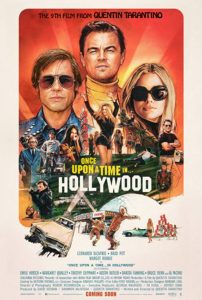
Once Upon a Time in Hollywood is the latest film from acclaimed director Quentin Tarantino. It follows Rick Dalton (Leonardo DiCaprio), who was once the star of a popular western TV show but is now playing side characters on other peoples’ shows. Dalton and his trusty stuntman/sidekick Cliff Booth (Brad Pitt) must now try to find success in a new Hollywood they don’t fit into, one that prefers young and cool celebrities like Dalton’s neighbor Sharon Tate (Margot Robbie).
Once Upon a Time is Tarantino’s most expensive film yet, but unlike his previous pieces filled to the brim with explosions, gore, and bullets (so… many… bullets), Once Upon a Time is one of his quietest, most lowkey outings in his career. The lighthearted scenes are classified by loud music from the wonderful soundtrack playing over shots of a vibrant and colorful Hollywood, and the most significant scenes are filled with a noticeable, deafening silence, like when Cliff must investigate a movie lot teeming with Manson family members, or when Dalton is embarrassing himself while fumbling his lines during a scene. This film is absent of the exploding cinema of Inglourious Basterds or the Candyland shootout of Django Unchained. This chillness makes any moment of excitement that much more explosive, contributing perfectly to the film’s overarching, surprisingly personal message.
I’d like to start by praising arguably the best part of this film: the recreation of 1960s Hollywood. The set design with authentic neon signs, the architecture, the billboards, the cars, as well as the costumes, which both stand out and blend in perfectly with the environment, highlight how a great deal of care went into painstakingly reconstructing this era.
The other aspect of the film in competition for the “best part” would definitely be the performances. DiCaprio brings the intense emotion vital to his character, and Pitt brings the laid-back, effortless nature perfect for shadowing and calming down the volatile Dalton. Even Margot Robbie, who disappointingly doesn’t have enough to do in this film, plays her optimistic, almost naive character perfectly. The star-studded supporting cast all also have excellent places in this film. Al Pacino is magnificent, Luke Perry is entertaining, Bruce Dern is fittingly gruff and stern, and Mike Moh as Bruce Lee is a hilarious, if a bit insensitive, addition to this film, but I think he fits well into the fantastical Hollywood mythos established in the movie.
Some have complained about the relaxed pace of the plot. In most films, a little excitement would be necessary to keep me engaged, but I’ve always thought Tarantino didn’t need to create big action scenes to keep it interesting. He’s such a wordsmith that his dialogue is all it takes to keep me glued to my seat and my attention fully on whatever is happening in the movie. I love the meandering plot, as well as how this film plays with structure, with a large chunk of the film taking place just over a day then jumping a full six months while remaining coherent. I’m convinced Tarantino could write a cookbook more captivating than half the movies that come out today. The plot does falter at points though, such as a lack of development for Sharon Tate, ands a completely baffling subplot involving Cliff’s former wife.
The cinematography in this film is also on point, and the way it plays with history is equally as entertaining as it was in Inglorious Basterds, in a wildly different way. Once Upon a Time in Hollywood remains a hilarious and excellently crafted reflection of a past era as well as a commentary on the spontaneity of celebrity life, two elements Quentin Tarantino must be feeling as he gets older, making this one of his most contemplative and personal films to date, certain to become one of the most beloved entries in Tarantino’s filmography.
